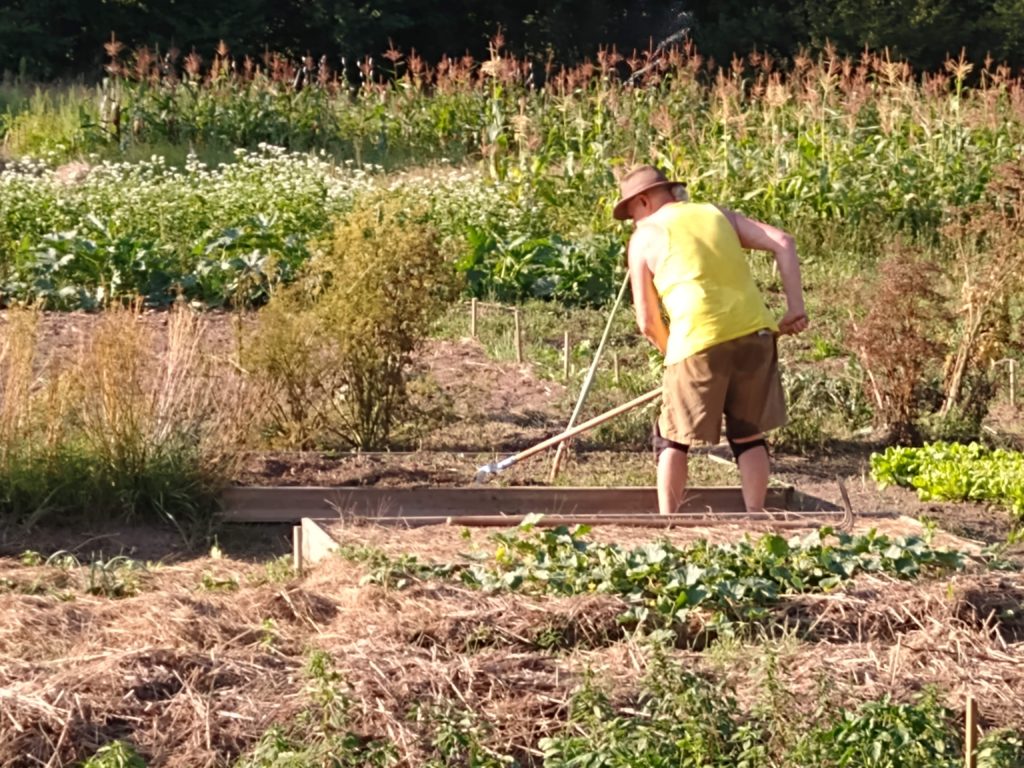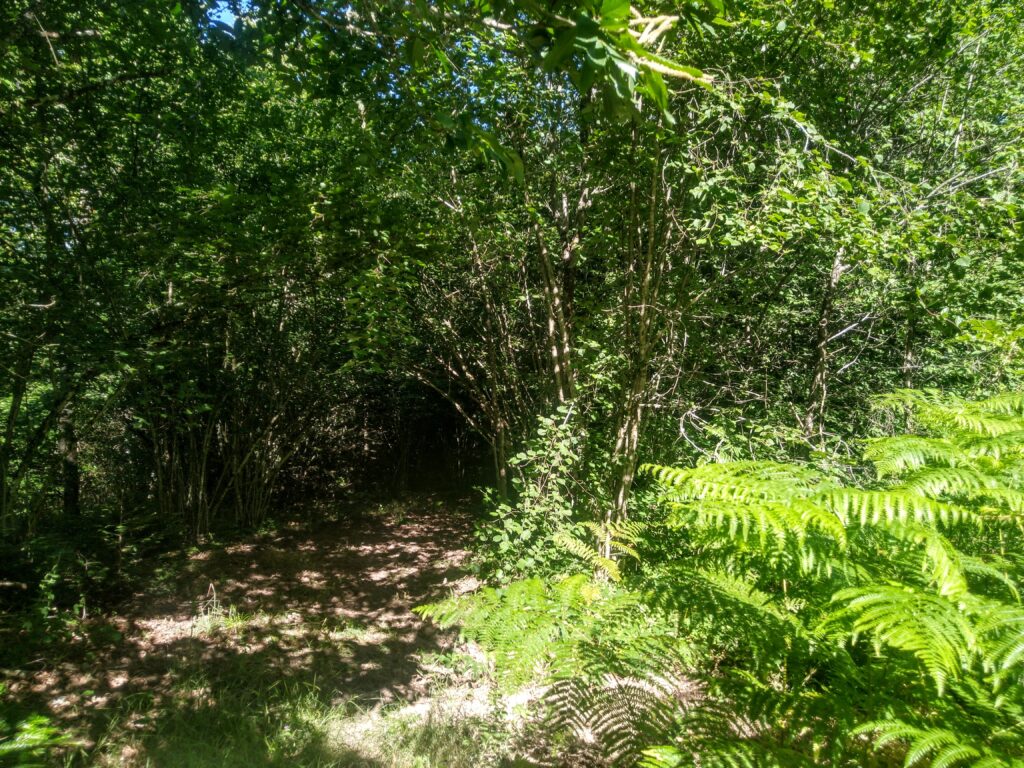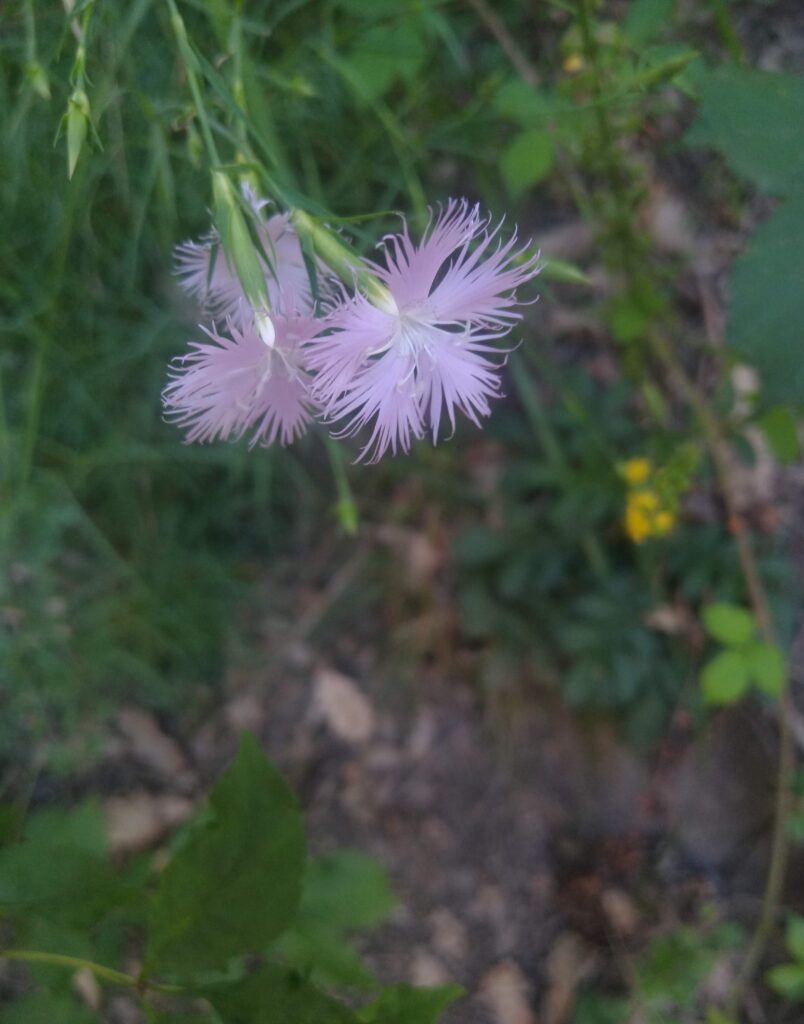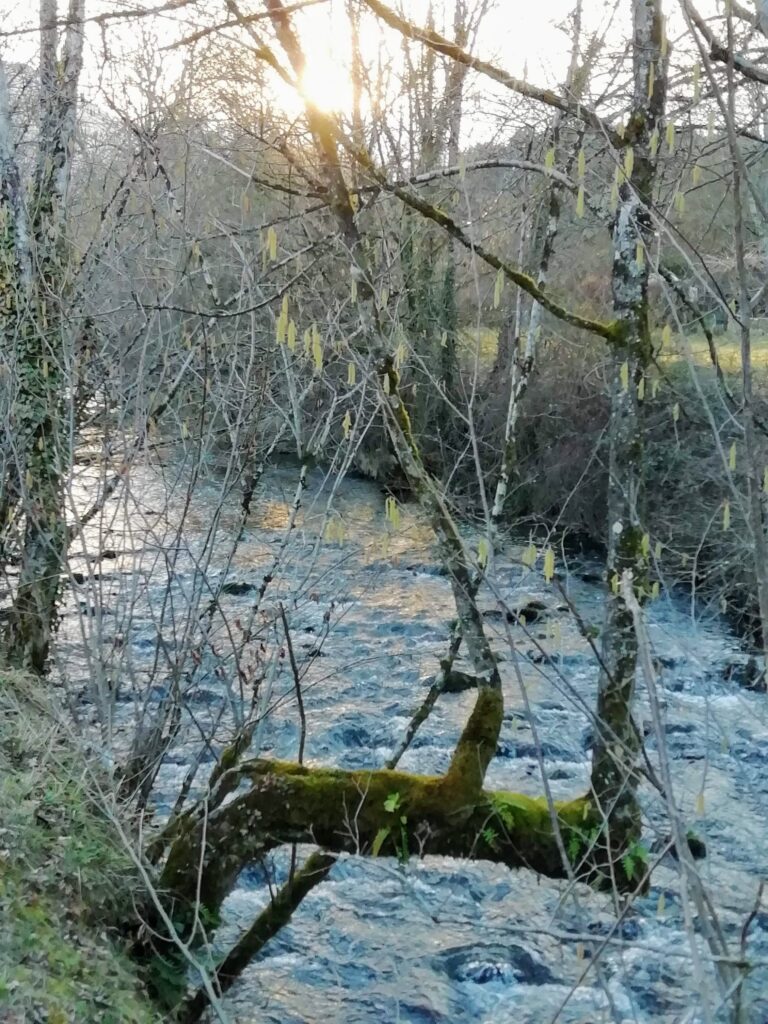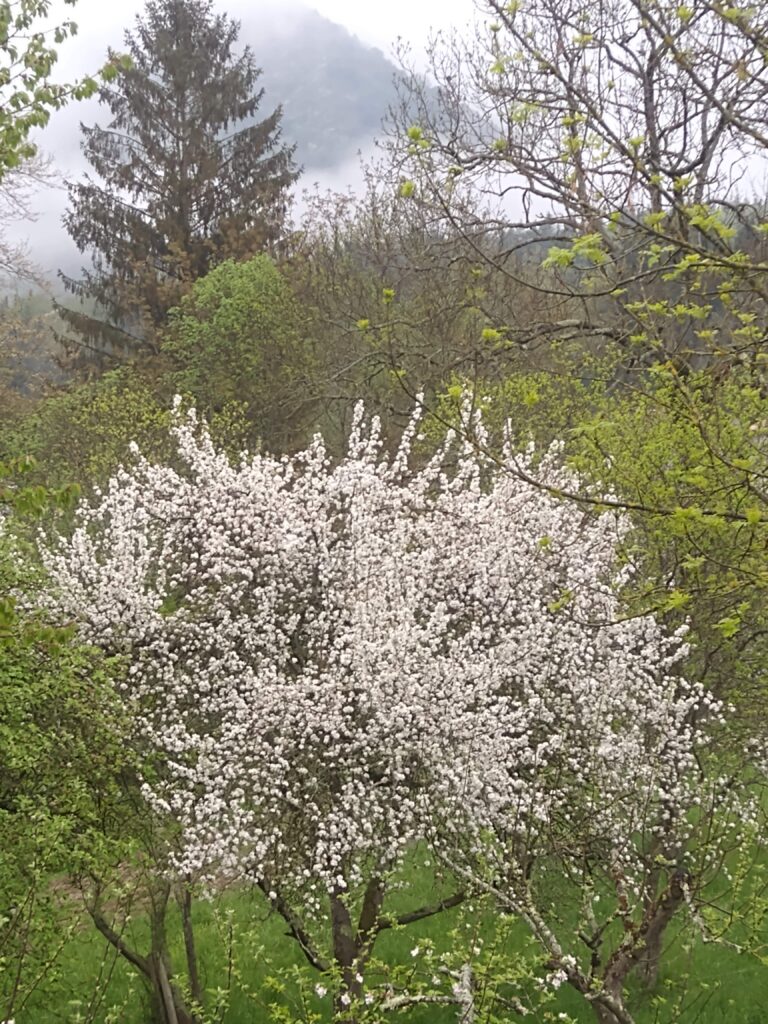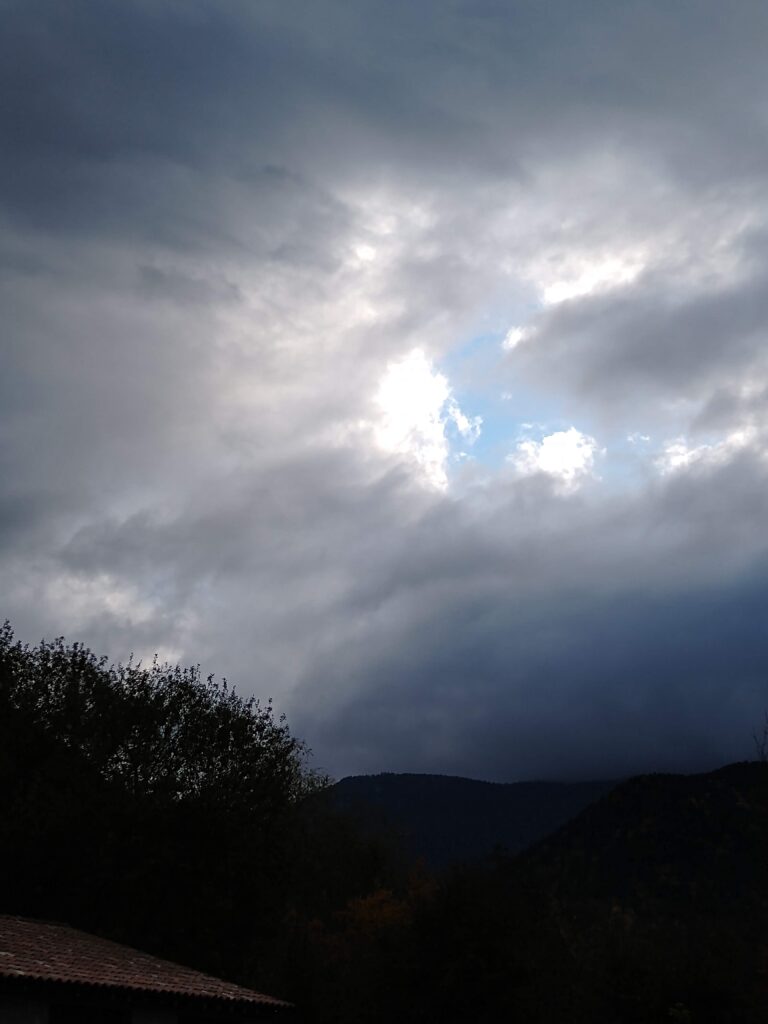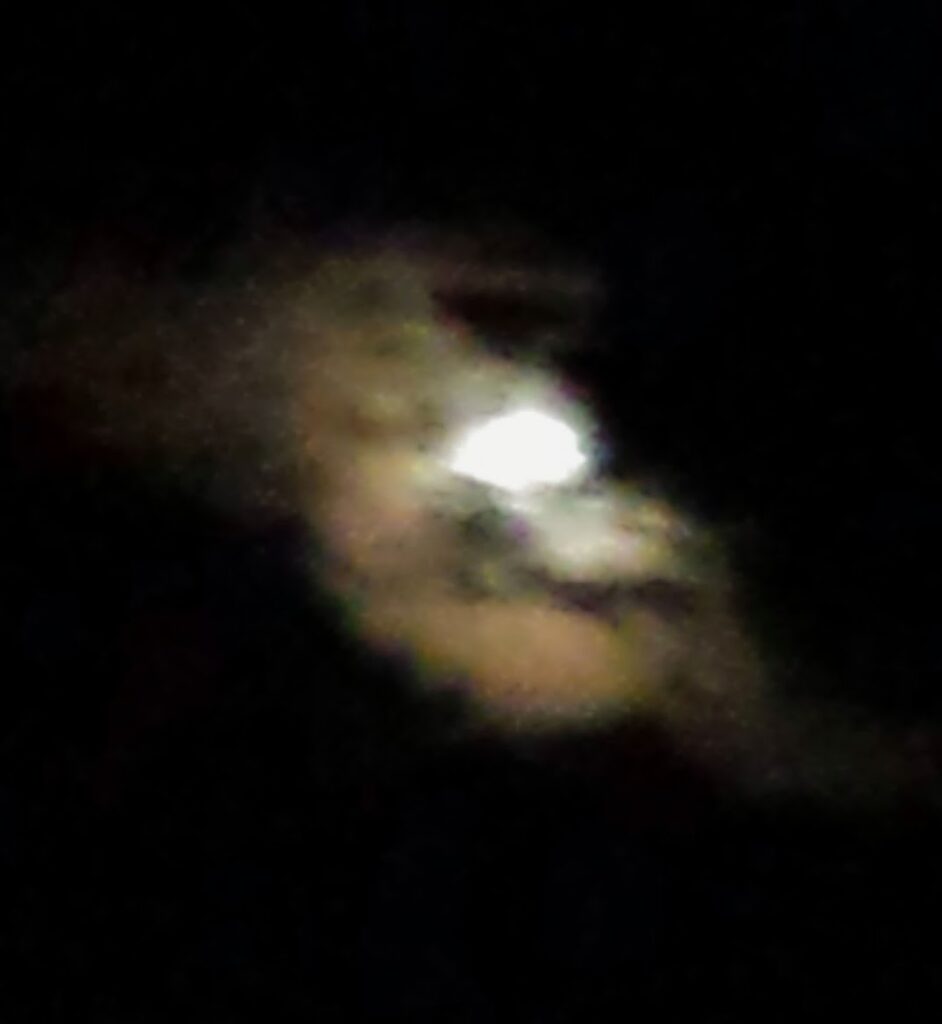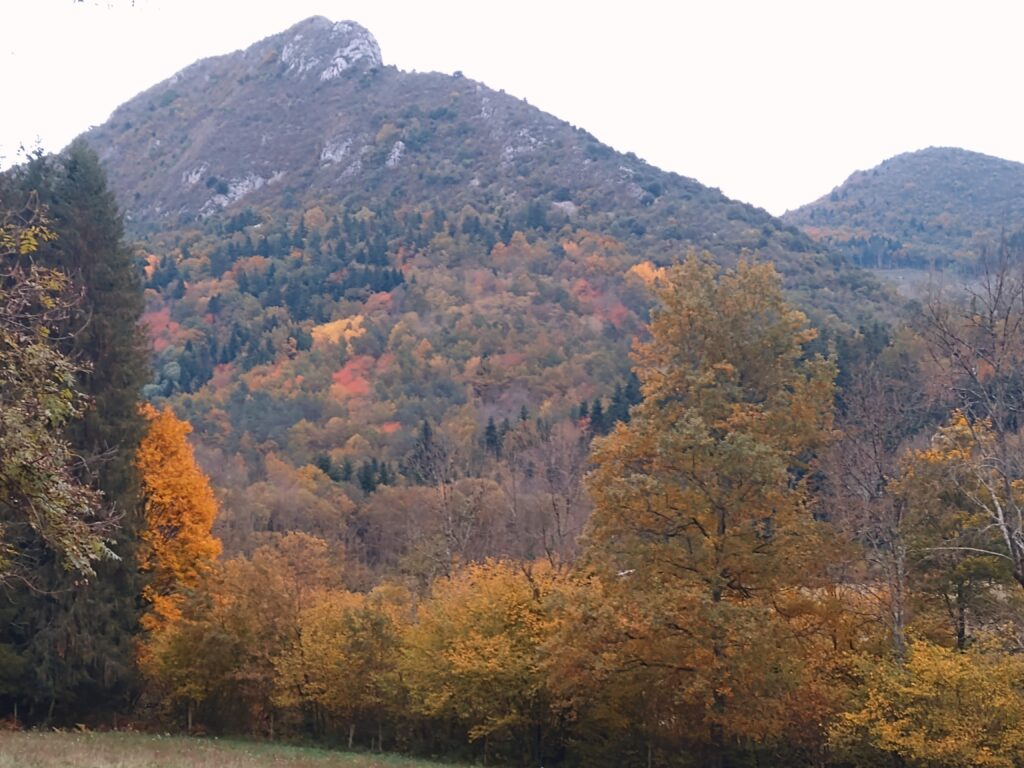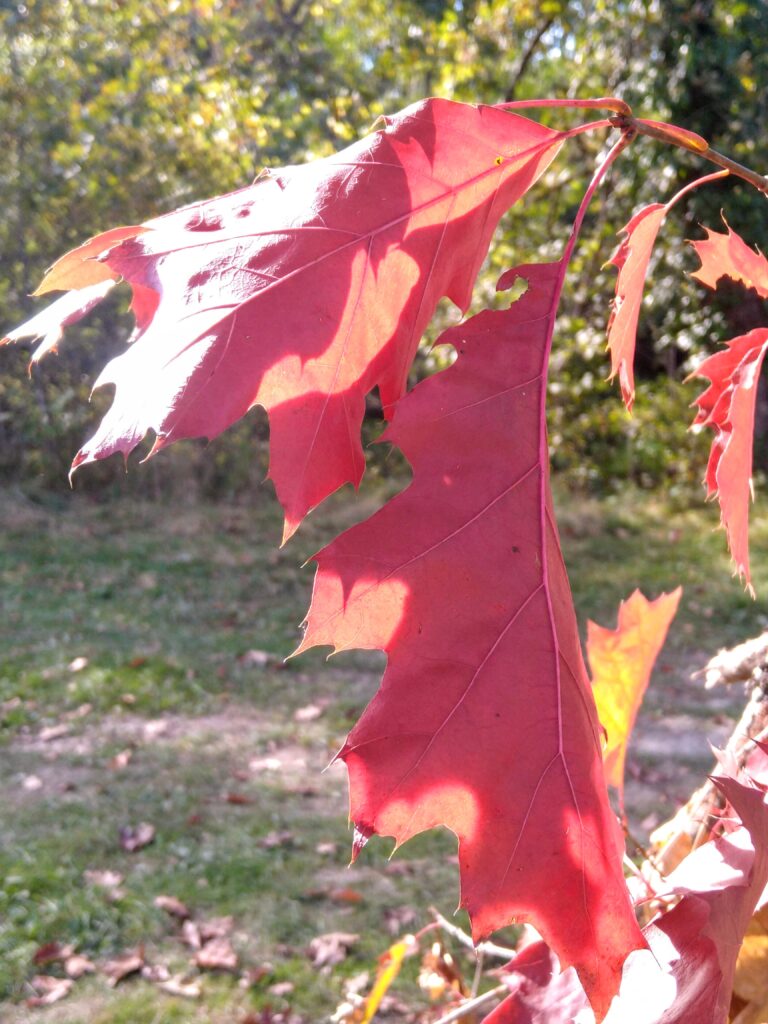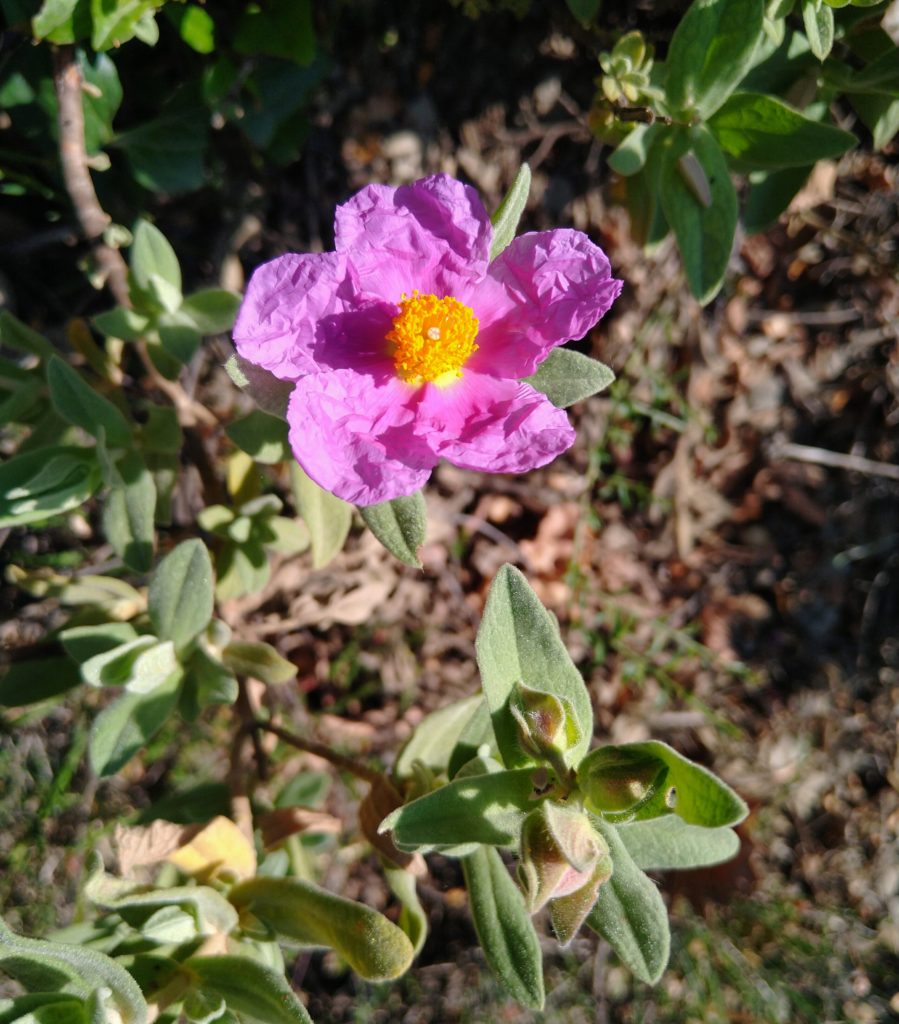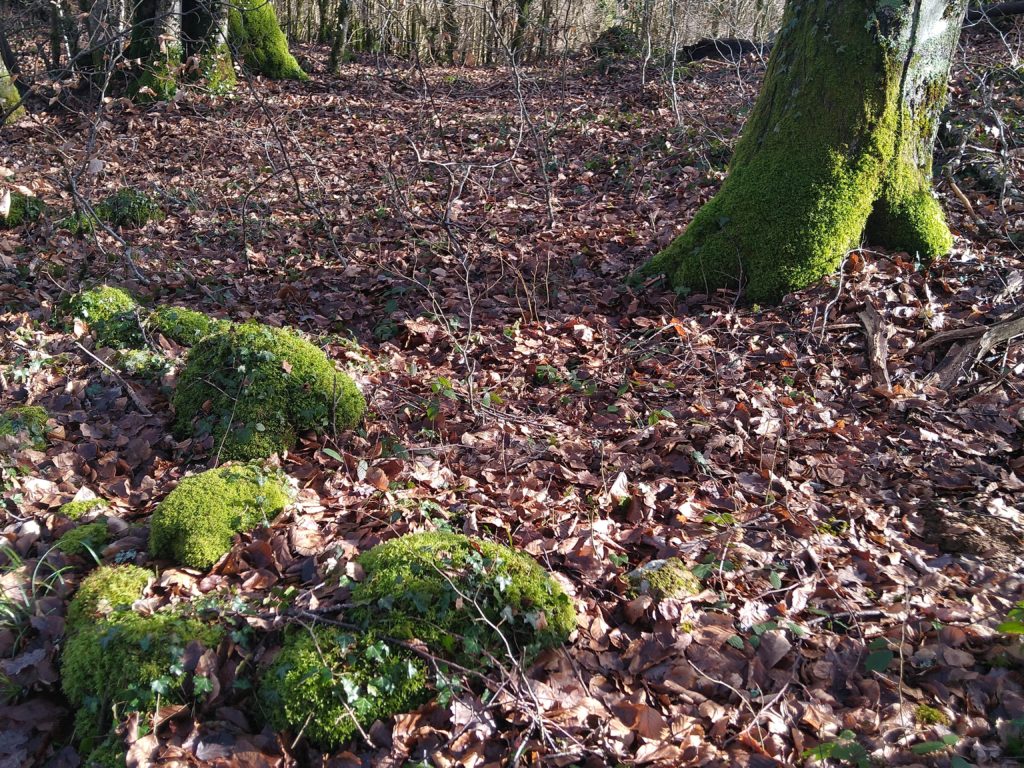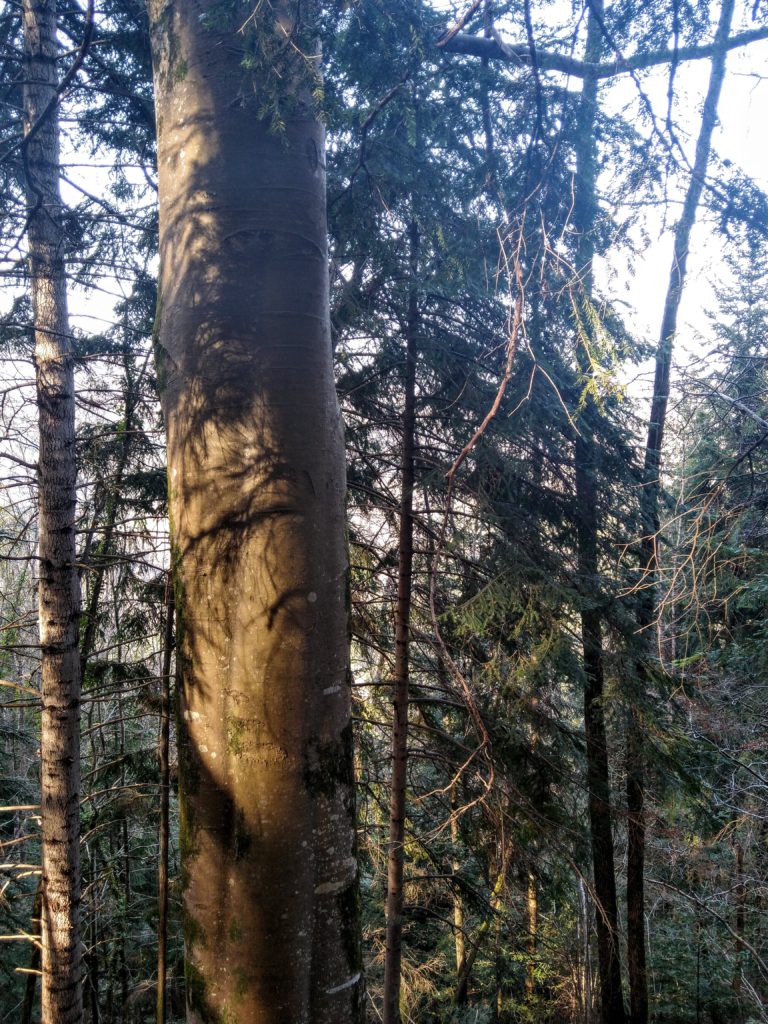It’s been two months since I’ve returned from my trip to the States. The summer here in France, cool and wet much of the time then suddenly very hot and dry before retuning to rain, has now turned the corner into fall. The time has gone by as if it were a heron on it’s flight home. Today, looking back through a lens, I can just make out the whirlwind that swept me there and back.
I prepared as best I could for the trip. I had waited for a moment when Macron had clearly said that Americans would be able to travel to France if they were vaccinated. I should be able to get back to my home in the Ariege. I bought my round-trip tickets. For weeks, I gathered presents and thought about what I would bring to each of the people I would see. It seemed so very long since I’d put my arms around any of them.
I packed carefully, unpacked and repacked the two suitcases I could now take. It was allowed as part of the ticket package I had to buy in order to anticipate yet another border closure. I made sure I could access the Covid-19 vaccine certificate on my smartphone. I printed out a copy, just in case. I checked and double-checked the other requirements for entry to the US from France and for my re-entry. I contacted all the people I hoped to stay with and those I’d visit.
My daughter had used up all her time-off from her job coping with two young children in a small apartment. She had patched together expensive child care for the summer but was missing a week, so I chose that time. I felt a pang of deep regret that the US doesn’t care enough about its people to provide such basic services as care for young children. Most other relatively well-to-do countries see such things as human rights. I looked forward to taking my granddaughter (who I’d seen only in two dimensions for so long) to the parks of Seattle, getting to know her again in her eight-year old form. What transformations would this unusual time have produced in her developing personality, in the expanse of her mind? How would my three year old granddaughter react to someone who she really only knew from a computer screen.
The day arrived when I would begin the first stage of my trip. Thunderstorms were predicted for the afternoon. My plane would leave early the next morning from Toulouse. I’d booked a hotel room near the airport for the brief night I’d spend before launching myself into space. We left plenty of time to drive from our village to the castle town of Foix so I could catch my afternoon train to Toulouse. I had scheduled a taxi to take me the few blocks from the motel to the airport the next morning, knowing from my last trip how sudden downpours could keep me from walking the few blocks.
On the way to Foix, the skies opened. Rain poured down so hard I could barely see to drive. Winds gusted with such force that big branches were falling here and there on the road. When we finally got to the autoroute, the storm had almost ended but, somehow, as happens unexpectedly, something had blocked the tunnel that diverts traffic around Foix. The traffic jam to get through Foix would delay us at least another hour. I might barely make it to my train.
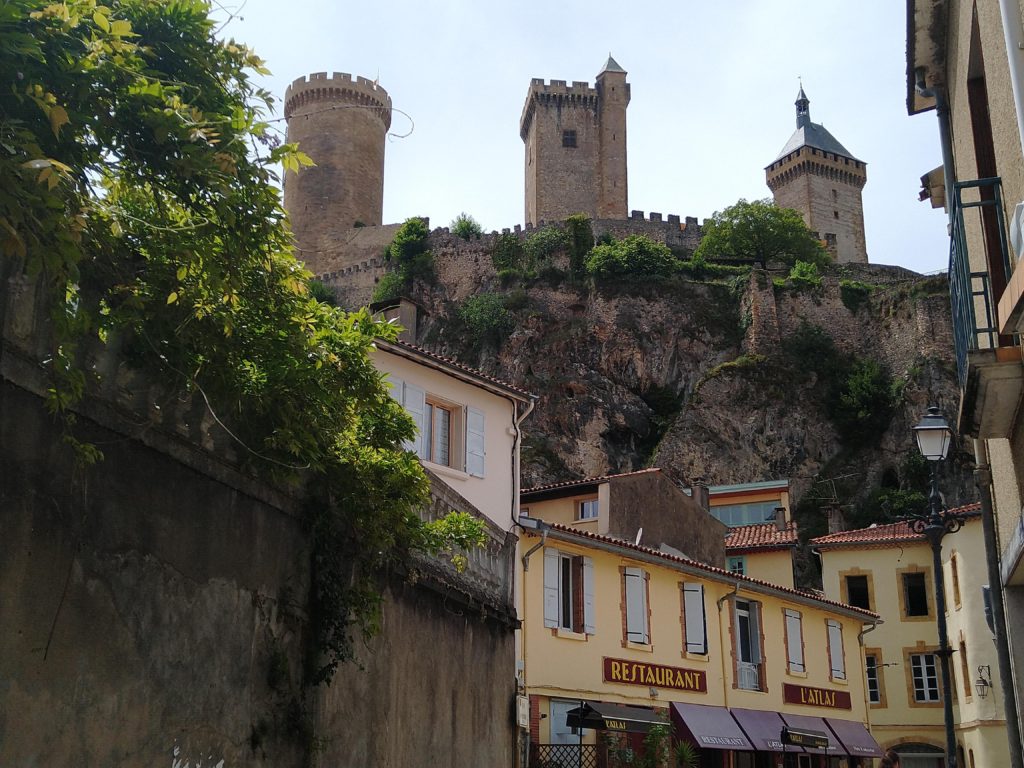
The delay got longer and longer. By the time we arrived, frazzled, at the station and I ran to see if perhaps the train itself had been delayed a few minutes, the people walking back from the platform told me the train to had been totally cancelled. No one knew why, but it was uncertain whether any more trains would come through that evening. Someone speculated that branches had fallen on the tracks. We would have to drive to Toulouse and Walter would have to drive back alone– without a license. “Trust to the Fates and let it go,” we agreed.
We made the trip, I checked in and we said our good-byes. I found a hotel restaurant within walking distance, had a decent meal and tucked in for the night, checking all my papers and passport before falling asleep for the few hours I had before my alarm went off. Walter called when he got home to tell me he’d made it back without incident. The back roads had been quiet and clear. I could now turn off the lights and drift off.
Waking with a start to my alarm, I got dressed quickly and wheeled my bags down to the lobby, empty at 3:30 am. A man, dark-skinned like so many in the hotel trade in Toulouse, was preparing the croissants and pastries for the breakfast that wouldn’t be available for another hour. I said “Bonjour” and asked if I might have a croissant to take with me. He smiled, wrapped one in a napkin and handed it to me. I turned to walked through the glass doors to start the long, long day travelling across an ocean and a continent.
In that enchanted time of day, the air was dry, dark and silent. I could be anywhere in the universe. I grappled with the parking lot gate, feeling dopey for not getting it, read the sign again, tried the directions again–no luck. The nice man from the lobby had fortunately stepped out for a cigarette. I motioned to him that I was stuck and he sprinted over to help me. I slipped through the gate saying “Merci, Monsieur. Vous êtes si gentil”. He, smiling indulgently again and saying “Pas de tout, Madame. Au Revoir!” went back to his duties in the dark motel.
I stood on the sidewalk waiting for my taxi. I waited ten minutes, called the number I had and got no answer. Another five minutes passed. Worried, I figured I’d better start walking. Turning on the GPS on my phone, I began to walk towards the airport. The instructions became more and more obscure. Was I really supposed to walk through this back alley? Couldn’t be.
Beginning to imagine various disasters, I turned around and started again, my heart starting to race. Before I could get back to the beginning, a taxi pulled up beside me. Was it my taxi or some random taxi looking for rides? It was my ride, come looking for me, cross that I hadn’t waited. His last ride had taken longer than expected and he had come as quickly as he could.
I made my plane easily. The woman who checked me in verified my negative PCR test. No one ever asked again. No one ever asked at all to see the vaccine certificate that had caused me such anxiety.
It seemed that I had chosen to travel in the window of time between that time when it had not been possible to fly from France to the US (except for “essential” reasons) and when a real onslaught of bookings were made. The plane was only about a third full. Anyone who wanted to stretch out on three seats was able to. I won’t say that it was actually comfortable, but it was so much better than sleeping fitfully almost upright, fearing that at any moment you might fall over on the person next to you or drool on their shoulder, that it felt like sheer and unanticipated luxury.
I arrived in San Francisco airport a bit earlier than scheduled. The airport in Toulouse, although busy even in the early morning, had been quiet. You could hear conversations here and there around you, but the general noise of human activity was subdued.
Here in San Francisco, as I walked out into the big hall, it was as if the volume had been suddenly turned up by some unseen hand. Groups of people went by, masked but still managing to speak loudly enough to be heard for a good distance. The men were particularly loud–their laughter was loud, they gesticulated broadly and spoke as if addressing a group in a bar full of music and chatter. The background music was loud. The announcements were loud.
But not everyone was loud. There were the older couples sitting quietly together, just as in France. There were small families with a child old enough to be looking at their phone or Ipad sitting quietly together. There were lots of individual adults of all shapes and sizes, walking aimlessly or determinedly, a small rolling suitcase following behind. But then there were the groups of young people that looked like sport teams off somewhere for a meet, talking continuously, laughing giddily, unmasked for the most part. I was overwhelmed by the activity and the noise. I found my gate and sat for the hour or so of my waiting time, looking at my phone like everyone else, creating a little shell around me, drawn every few moments to peer sideways into the lives of the other humans around me. They were all going somewhere different from the place where they usually found themselves, each now having arrived on a new stage, some easy with their lines, some searching for direction.
The plane to Seattle carried the same noisy little groups, their members calling out to the flight attendants for this or that. Things seemed quite amiable. People were enjoying the opportunity to travel again. They were light-hearted. I thought “I actually like this about Americans. We don’t tend to put a lid on things.” I began to remember what it was like to be in this place, to be so accustomed to it that it really was all that existed.
When we arrived in Seattle, I was still feeling pretty fit, despite only an hour or two of sleep here and there for about twenty-eight hours. I had been drinking lots of water during the flights, and eating only fruits and a bit of vegetables and bread. It seemed to help. While I waited for my bag at the Seattle airport, I turned around once clockwise to reset my body’s orientation as instructed by my learned friend . No one stared. I found my way through the fairly familiar landmarks of the airport and walked the long trek to the light rail station. It seemed like miles.
The train ride gave me time to settle into the now-strange atmosphere. A country with myriad cultures I have lived a life in, a city I have come to know over forty years though never my home, now they are places that dwell only in holograms in my mind. Being present in them again gave me the sensation that I had suddenly been sucked through some hole in the universe into an ongoing film. And I hadn’t been hired to play a role. I had to figure out where I fit in the unfolding screen-play.
At the first stop, a young woman covered in tattoos, her blond hair cropped close, skillfully lugged her bike through the open train doors, shifted it around and slid it into a space reserved for bikes. She sat down across from me and at a slight angle as not to intrude. Looking ahead, a wisp of a smile played briefly around her lips, an acknowledgement of my attention. As we pulled out of the station, she turned her head towards me and asked,
“You coming from the airport?”
“Yes” I responded. “I’ve just arrived from France.”
She nodded.
“You must be tired.”
I remembered my line in the script. The tenderness between us had awakened it.
“Yeah, that’s true. It’s a really long trip, especially now with Covid.”
We were done. She lapsed into silence, her eyes unfocused, gazing at the other side of the car. We traveled together in a kind of satisfying peace until we reached her station and she reversed her deft actions with her bike. As she paused for a slight moment to wait for the doors, she looked over her shoulder towards me and said with a warm smile,
“Have a good stay. It was nice to meet you”.
“Thanks! You have a good day, too.” I replied, returning the little wave of warmth in my own smile.
The next stage of my journey had begun. I was a long way from home, but home.
